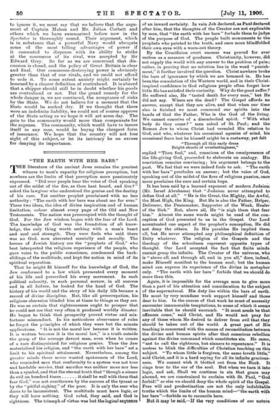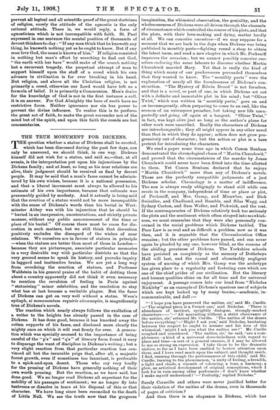"THE EARTH WITH HER BARS."
THE literature of the ancient Jews remains the greatest witness to man's capacity for religious perception, but nowhere are the limits of that perception more passionately expressed. "Did ever people hear the voice of God speaking out of the midst of the fire, as thou haul heard, and live F" asked the lawgiver who understood the genius and the destiny of his race. Yet another prophet proclaimed with no less authority : "The earth with her bars was about me for ever." These two ideas, the idea of divine inspiration and of human limitation, colour almost every page of the Old and New Testaments. The nation was preoccupied with the thought of God. For the Jew wisdom began with the fear of the Lord. The knowledge of God was the foundation of all know- ledge, the only thing worth seeking with a man's heart and soul and strength. They were fools who said there was no God, men aberrated mentally and morally. The heroes of Jewish history are the "prophets of God," who best interpreted the religious experience of the people, who gave voice to the public conscience, condemned the back- slidings of the multitude, and kept the nation in mind of its spiritual separation.
That he might fit himself for the knowledge of God, the Jew conformed to a law which permeated every moment of his life and prescribed his every movement. In each political calamity, in each personal sorrow, in all success and in all failure, he looked for the hand of God. The history of his world and the story of his daily life became a record of divine discipline. . But, like all preoccupation, his religious obsession blinded him at times to things as they are. He was so certain that righteousness ought to prosper that he could not see that very often it produced worldly disaster. He began to think that prosperity proved virtue and mis- fortune misconduct. In his meticulous observance of rules lie forgot the principles of which they were but the minute applications. "It is not the moral law because it is written. It is written because it is the moral law," is a truth outside the grasp of the average devout man, even when be comes of a race distinguished for religious genius. Thus the Jew materialised his religion, and "the earth with her bars" set a limit to his spiritual attainment. Nevertheless, among the greater minds there never wanted spokesmen of the Lord, who reminded men that conformity to a system was not true and laudable service, that sacrifice was neither more nor less than a symbol, and that the eternal truth that" though a sinner
do evil an hundred times it shall be well with them that fear God," was not overthrown by the success of the tyrant or by the "pitiful sighing" of the poor. It is only the seer who dares to be inconsistent. The multitude must have logic, or they will have nothing. God ruled, they said, and God is righteous. The triumph of virtue was but the logical sequence of an inward certainty. In vain Job declared, as Paul declared after him, that the thoughts of the Creator are not explicable by men, that "the earth with her bars" forbade them to judge of the purpose of God. The people built monuments to the prophets who pointed to the truth, and once more blindfolded their own eyes with a worn-out theory.
By the Crucifixion overt success was proved for ever useless as a measure of goodness. Christianity, however, did not supply the world with any answer to the problem of pain; rather, in proving that no solution lies in the word "punish- ment," it further involved the question. •Christ nowhere broke the bars of ignorance by which we are hemmed in. He has been the consolation of the Western world, and in their Christ- inspired confidence in God religious people often forget how little He has satisfied their curiosity. Why do the good suffer ? He suffered also, He "tasted death for every man," but He did not say. Where are the dead ? The Gospel affords no answer, except that they are alive, and that when our time also is finished we must commend our spirits into the hands of God the Father, Who is the God of the living. We cannot conceive of a disembodied spirit. "With what body do they come F" men asked of St. Paul; and the Roman Jew to whom Christ had revealed His relation to God, and who, whatever his occasional agonies of mind, his occasional fears lest he himself might be a castaway, yet felt
"Through all this early dress Bright shoots of everlastingness," replied "Thou fool," and, conscious of the omnipresence of the life-giving God, proceeded to elaborate an analogy. His conviction remains convincing; his argument belongs to the past. We feel that we were indeed fools to ask. "The earth with her bars" precludes an answer; but the voice of God, speaking out of the midst of the fires of religious passion, once more proclaims the sure and certain hope.
It has been said by a learned exponent of modern Judaism (Mr. Israel Abrahams) that "Judaism never attempted to define God at all." "He is the Great, the Mighty, the Awful, the Most High, the King. But He is also the Father, Helper, Deliverer, the Peacemaker, Supporter of the Weak, Healer of the Sick." But, above all, He "is nigh them that fear him." Almost the same words might be used of the con- ception of God presented to us in the Gospel. Our Lord accentuated one aspect of the prophet's conception, He did not deny the others. In His parables He implied them all, but He never attempted any philosophical definition of Deity whatever. The religion of the Gospels and the theology of the schoolmen represent opposite types of thought. Our Lord accepted the fact that finite minds cannot grasp the infinite. The Creator of the universe, who is "above all, and through all, and in you all," does, indeed, make Himself manifest to the human soul; but the human mind can express its experience of the divine in metaphor only. "The earth with her bars" forbids that we should do more than this.
Again, it is impossible for the average man to give more than a part of his attention and consideration to the subject of the supernatural. His duty lies within the bars of earth. He must by very mundane work support himself and those dear to him. In the course of that work he must of necessity encounter innumerable temptations, to some of which it name inevitable that he should succumb. "It must needs be that offences come," said Christ, and He would not pray for any of those whom He desired to deliver from evil that they should be taken out of the world. A great part of His teaching is concerned with the means of reconciliation between the divine and human spirits after that conscious rebellion against the divine command which constitutes sin. He came, "not to call the righteous, but sinners to repentance." It is useless to blink the difficulties of Christian teaching on this subject. "To whom little is forgiven, the same loveth little," said Christ, and it is a hard saying for all its infinite gracious- ness. We cannot wish it blotted out from the Book. It rings true to the ear of the soul. But when we turn it into logic, and ask, Shall we continue in sin that grace may abound, we are constrained to exclaim with St. Paul, "God forbid!" or else we should deny the whole spirit of the Gospel. Free will and predestination are not the only indubitable truths which the limits of the human mind—" the earth with her bars "—forbids us to reconcile here.
But it may be ea' the very conditions of our nature prevent all logical and all scientific proof of the great doctrines of religion, surely the attitude of the agnostic is the only rational attitude. There is, we would reply, a form of agnosticism which is not incompatible with faith. St. Paul expressed in one sentence the mental position of thousands of devout thinkers to-day: "If any man think that he knoweth any thing, he knoweth nothing yet as he ought to know. But if any man love God, the same is known of him." If religion consisted in nothing but man's effort by searching to find out God, "the earth with her bars" would make of the search nothing but a recurrent tragedy, the perpetual attempt of man to support himself upon the staff of a creed which his own advance in civilisation is for ever breaking in his hand. But religion, and above all the Christian religion, is not primarily a creed, otherwise our Lord would have left us a formula of belief. It is primarily a Communion. Man's desire for the knowledge of God is not in the first instance a call, it is an answer. For God Almighty the bars of earth have no restrictive force. Neither ignorance nor sin has power to prevent the divine influence. To realise this is to perform the great act of faith, to make the great surrender not of the mind but of the spirit, and upon this faith the creeds are but commentaries.







































 Previous page
Previous page